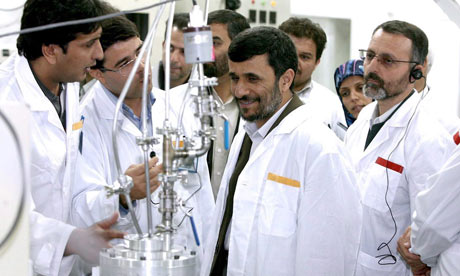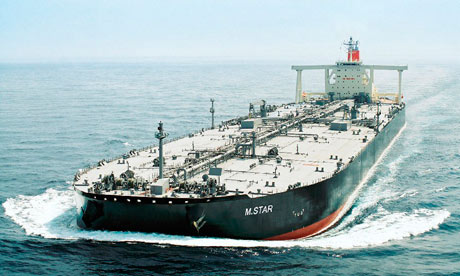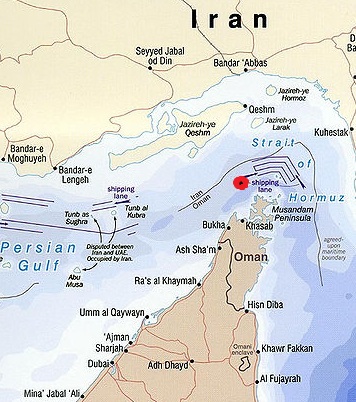- Joined
- Mar 28, 2009
- Messages
- 1,482
- Points
- 0
Israel attack wouldn't stop Iran nuclear program, says U.K. study
Oxford Research Group predicts Israeli attack would spark long war that might even encourage Iran further.
An Israeli attack on Iranian nuclear facilities would start a long war and probably not prevent Iran from eventually acquiring nuclear weapons, a think-tank said on Thursday.
The Oxford Research Group, which promotes non-violent solutions to conflict, said military action should be ruled out as a response to Iran's possible nuclear weapons ambitions.
"An Israeli attack on Iran would be the start of a protracted conflict that would be unlikely to prevent the eventual acquisition of nuclear weapons by Iran and might even encourage it," it said in a report.
It would also lead to instability and unpredictable security consequences for the region and the wider world, it added.
The United Nations Security Council imposed a fourth round of sanctions against Iran last month over its contested nuclear program, which the West suspects is aimed at developing atomic weapons in secret.
Iran says it wants nuclear energy for peaceful uses only.
The report, by Paul Rogers, professor of peace studies at the University of Bradford, said U.S. military action against Iran appeared unlikely but Israel's capabilities had increased.
"Long-range strike aircraft acquired from the United States, combined with an improved fleet of tanker aircraft, the deployment of long-range drones and the probable availability of support facilities in northeast Iraq and Azerbaijan, all increase Israel's potential for action against Iran," the report said.
Israeli leaders usually speak only of leaving all options on the table, although Israeli Deputy Prime Minister Moshe Yaalon specifically said in May that Israel had the capability to hit Iran.
Israel is widely believed to have the Middle East's only nuclear arsenal, but refuses to confirm or deny this.
The Oxford report estimated it might take three to seven years for Iran to develop a small arsenal of nuclear weapons if it decided to do so. It said there was no firm evidence such a decision had been taken by the Islamic Republic.
Any Israeli strike would be focused not only on destroying nuclear and missile targets but would also hit factories and research centers and even university laboratories to damage Iranian expertise, the report said.
This would cause many civilian casualties, the report added.
Military action would include the direct bombing of targets in Tehran and probably include attempts to kill technocrats who managed Iran's nuclear and missile programs, the report said.
Iran's responses to an Israeli attack could include withdrawing from the nuclear Non-Proliferation Treaty and immediate action to produce nuclear weapons to deter further attacks, the report explained.
They could also include missile attacks on Israel, closing the Strait of Hormuz to push up oil prices and paramilitary or missile attacks on Western oil facilities in the Gulf.
After a first strike, Israel might have to carry out regular air strikes to stop Iran developing atom bombs and medium-range missiles, the report said. "Iranian responses would also be long-term, ushering in a lengthy war with global as well as regional implications," Rogers said.
Other options open to the West were to redouble efforts to get a diplomatic settlement or accept that Iran may eventually acquire a nuclear capability and use that as the start of a process of balanced regional de-nuclearization, the report concluded.
Oxford Research Group predicts Israeli attack would spark long war that might even encourage Iran further.
An Israeli attack on Iranian nuclear facilities would start a long war and probably not prevent Iran from eventually acquiring nuclear weapons, a think-tank said on Thursday.
The Oxford Research Group, which promotes non-violent solutions to conflict, said military action should be ruled out as a response to Iran's possible nuclear weapons ambitions.
"An Israeli attack on Iran would be the start of a protracted conflict that would be unlikely to prevent the eventual acquisition of nuclear weapons by Iran and might even encourage it," it said in a report.
It would also lead to instability and unpredictable security consequences for the region and the wider world, it added.
The United Nations Security Council imposed a fourth round of sanctions against Iran last month over its contested nuclear program, which the West suspects is aimed at developing atomic weapons in secret.
Iran says it wants nuclear energy for peaceful uses only.
The report, by Paul Rogers, professor of peace studies at the University of Bradford, said U.S. military action against Iran appeared unlikely but Israel's capabilities had increased.
"Long-range strike aircraft acquired from the United States, combined with an improved fleet of tanker aircraft, the deployment of long-range drones and the probable availability of support facilities in northeast Iraq and Azerbaijan, all increase Israel's potential for action against Iran," the report said.
Israeli leaders usually speak only of leaving all options on the table, although Israeli Deputy Prime Minister Moshe Yaalon specifically said in May that Israel had the capability to hit Iran.
Israel is widely believed to have the Middle East's only nuclear arsenal, but refuses to confirm or deny this.
The Oxford report estimated it might take three to seven years for Iran to develop a small arsenal of nuclear weapons if it decided to do so. It said there was no firm evidence such a decision had been taken by the Islamic Republic.
Any Israeli strike would be focused not only on destroying nuclear and missile targets but would also hit factories and research centers and even university laboratories to damage Iranian expertise, the report said.
This would cause many civilian casualties, the report added.
Military action would include the direct bombing of targets in Tehran and probably include attempts to kill technocrats who managed Iran's nuclear and missile programs, the report said.
Iran's responses to an Israeli attack could include withdrawing from the nuclear Non-Proliferation Treaty and immediate action to produce nuclear weapons to deter further attacks, the report explained.
They could also include missile attacks on Israel, closing the Strait of Hormuz to push up oil prices and paramilitary or missile attacks on Western oil facilities in the Gulf.
After a first strike, Israel might have to carry out regular air strikes to stop Iran developing atom bombs and medium-range missiles, the report said. "Iranian responses would also be long-term, ushering in a lengthy war with global as well as regional implications," Rogers said.
Other options open to the West were to redouble efforts to get a diplomatic settlement or accept that Iran may eventually acquire a nuclear capability and use that as the start of a process of balanced regional de-nuclearization, the report concluded.












